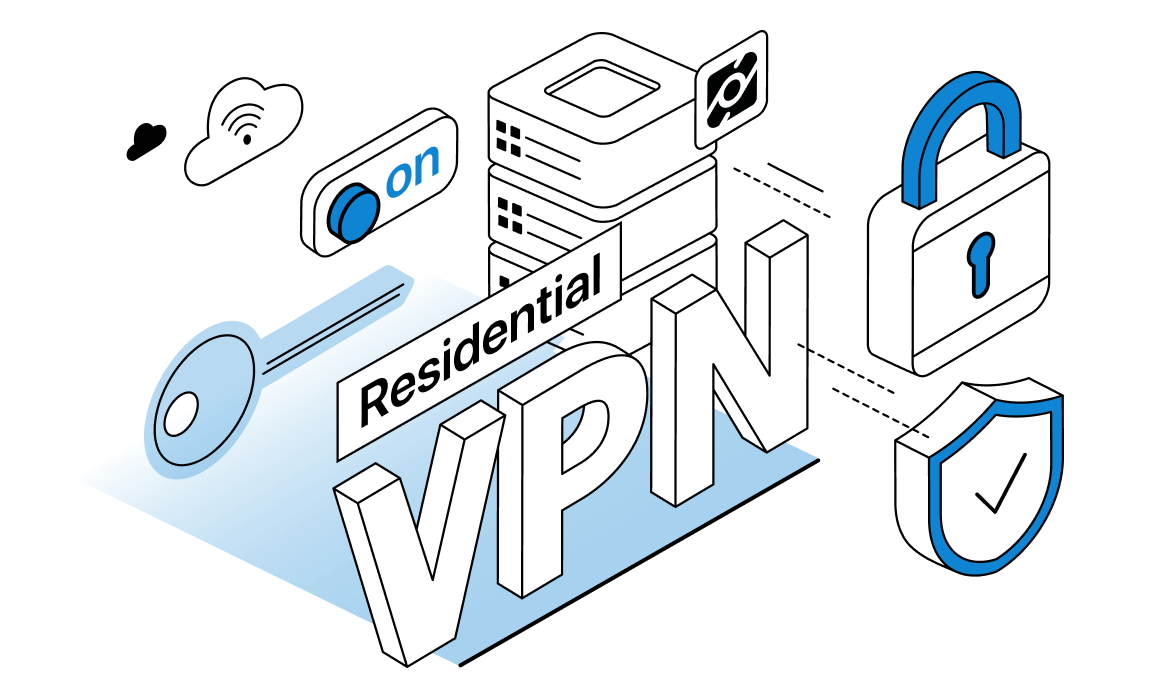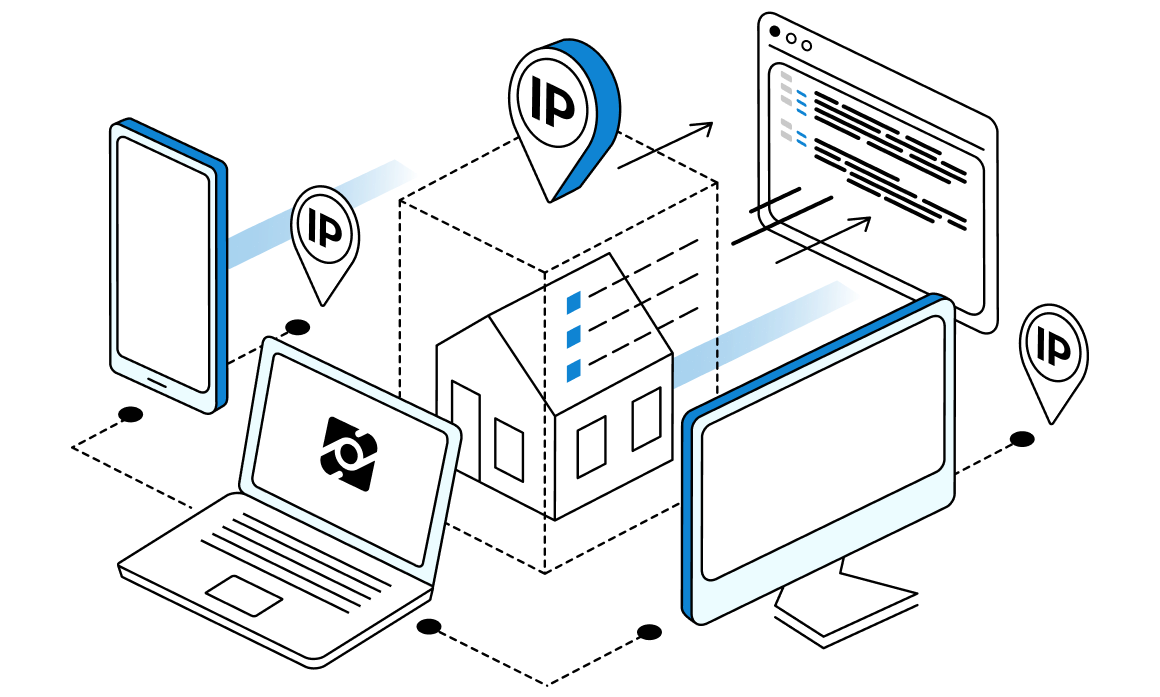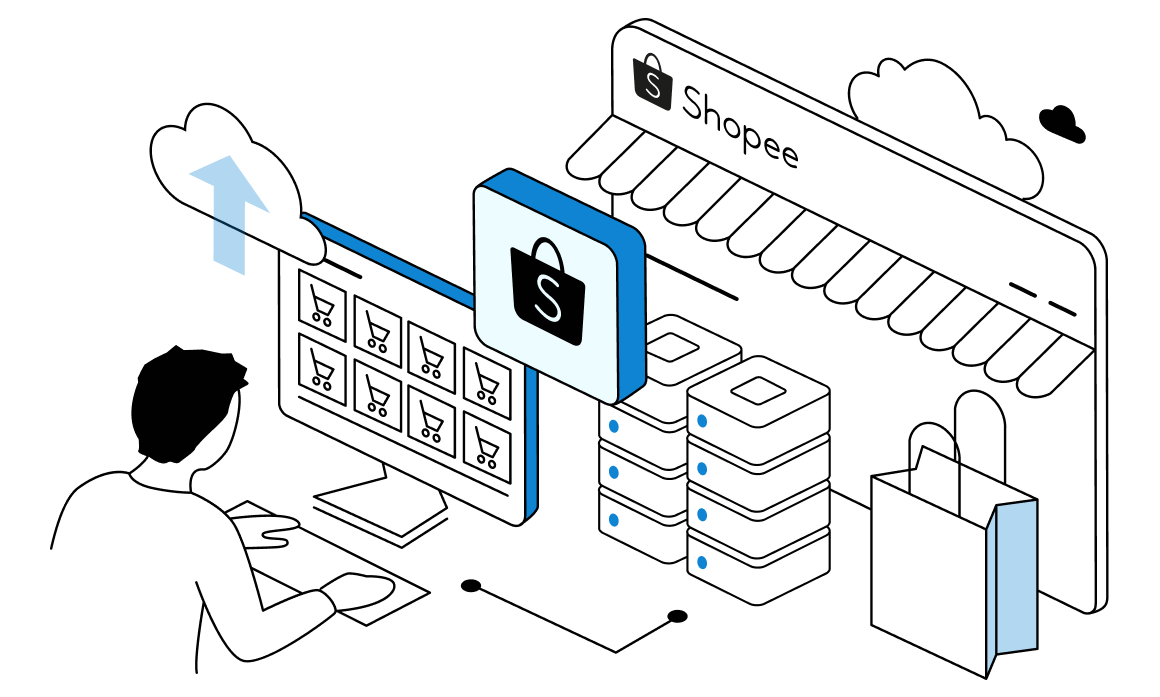The modern Internet forces us to be more and more attentive to the security and privacy topics of online activities. This trend is becoming more popular, both for regular users and businesses. One of the solutions to this problem lies in using special tools like VPNs or proxies to increase your privacy online. In this article, we will look at the business IP, residential IP, VPN proxy, and residential VPN tools for your online privacy.
What is a Residential VPN? How Does it Work?
You can think of a residential proxy VPN as the network that routes your requests via residential IPs. Put differently, you are able to use and share regular household IPs with other users, and your traffic is cyclically routed through them.
This way, users of residential VPNs can access sites with IPs from different countries. A function of this kind allows you to avoid any geo-restrictions and access any needed content online. This can serve as an answer to the question of what is residential proxies is, because a proxy of this type works in the same manner.
Overall, this type of VPN is considered pretty safe to use, because all of the network is not related to the data centers, so there is no additional risk of a real compromise. Most of these VPNs function on a peer-to-peer basis, but the companies that operate them are still profit-oriented. So, users still need to fully trust their data to the companies they choose to use.
What is a Residential IP Address?
Regular IP addresses assigned by ISP are known as residential IP addresses. Typically, these IPs are linked to actual locations and households. In many ways, IPs of this kind can look less suspicious and clean than a datacenter one. Dedicated IP lookup sites allow you to verify whether you are using a residential IP address. You can check if a proxy is residential on your provider’s site.
Benefits of VPNs with Residential IPs
The residential type of VPN is primarily targeted at creating a more secure and anonymized connection to the Internet than a regular connection through the residential IP. The main audience for these VPN types is primarily regular users of small businesses who want a simple tool for avoiding geo-restrictions and anonymous browsing.
Thus, security levels are the primary distinction between a residential IP and a VPN using this IP. VPN is constantly using encryption to hide the link between the endpoint and your computer. This can save you from some of the tracking and spying online, as well as protect you from hacker treats. But if you go with a shady provider, your traffic can still be intercepted at the end point. For this reason, you must exercise caution when selecting your provider.
The residential type of VPN can offer a faster and more reliable connection to any required websites than other VPNs. This happens because regular VPNs are built on a wide network base, so your request needs to take a long route before reaching the needed site. This benefit may be crucial if you are focused on constant content downloading or streaming any data. Plus, you can use this setup and residential proxy for online surveys, or you can start using proxy for online games. All of this is covered by the possibilities of residential proxies and residential VPNs.
Types of Residential VPNs
There are various main types of residential VPNs. A dedicated residential VPN or static residential IP VPN is the name of the first kind. With this kind, you can get a distinct IP address connected to a specific place. Because of the faster connections, this type of feature is excellent for tasks involving online gaming and streaming.
The next type is called a shared residential VPN service. In this case, several users can utilize the IP address of the server at the same time. This type can be considered more secure because, in the end, it is hard to track the activity of each user on the server. Plus, in the end, backtracking this connection will always lead to different IPs.
Another type of VPN uses dedicated residential IPs. With a connection of this kind, you will get a new IP address each time you connect to the server. This way, it becomes way to hard to track your activity online. From a backtrack point of view, your connection will always have a different IP address at the end.
A mobile residential VPN is the final category. This kind is intended specifically for connection to the servers from mobile devices. In this scenario, the connection’s speed and stability also become crucial factors.
Get 20% off the original price with our special coupon!
BCR20
Residential VPNs vs Residential Proxies
As previously stated, the source of IP addresses is the primary distinction between residential VPNs and other forms of private networks. However, how does a VPN such as this differ from using a dedicated residential proxy?
Here, the protocols themselves represent the primary distinction. A VPN is designed to encrypt the communication between the devices; when using dedicated residential proxy, the server usually just redirects your connections through the server. Depending on the specific setup, a VPN connection can be more secure and protected. Hovewer proxies can also use different options to become anonymous and even encrypted. Plus, just like with VPNs, you can use a static residential proxy to get a static IP address for any of your tasks. The same way works difference between residential and isp proxy. In the first case, you get an IP from a regular user device, and the second ISP itself provides you with an address from the pool.
Remember that neither a VPN nor a proxy can provide complete anonymity or protection from online threats, not even with best cutting-edge methods like obfuscation.
Residential VPNs and proxies perform many of the same tasks. You can get advanced anonymity, an infinite pool of requests, and fast and dependable connections with either of these technologies.
Residential VPNs vs Datacenter VPNs
We can contrast residential VPNs with datacenter VPNs now that we have more knowledge about them. Fundamentally, these two kinds of servers function and offer you the same features. The primary distinction is where they get their IPs from. In the same manner, there is a difference between residential and datacenter proxy. Datacenter virtual private networks (VPNs) are founded on networks of datacenters dispersed globally or within cloud environments. Just like with datacenter rotating proxy or a residential rotating proxy, you can utilize this function to get a rotating IP for your VPN.
Datacenter types are regularly a bit cheaper, especially if we are talking about big pools for business tasks. Another distinction lies in IP sharing – residential IP for VPNs is more often shared between several users, which can lead to minor problems. This also means VPN providers will have less control over IP use overall. With datacenter proxy or VPNs, you should have more control over IP usage and stubble upon fewer problems in connection.
Are Residential VPNs Legal to Use?
Using a residential VPN is permissible in almost all situations. You are free to use these VPNs just like you would use residential proxies, as long as you don’t use them for any illicit purposes. Remember that the majority of residential VPN network will ask you to share a portion of your internet traffic, including your IP address.
Frequently Asked Questions
Please read our Documentation if you have questions that are not listed below.
-
How do residential VPNs work?
Residential VPNs utilizes regular IPs assigned by ISP to real locations. This way, your connection in the end looks more clean and legit, allowing you to visit any sites without problem.
-
What kind of proxies can you use to replace a residential VPN?
Most of the residential VPN functions can be replaced by a proxy with the same kind of IP. For more increased security, you can use anonymous residential proxies.
-
What is the difference between residential proxies and VPNs?
The main difference between residential proxies and VPNs lies in the protocol for connection. VPNs usually tend to encrypt all of your connections, whether the proxy just redirects them to the server.
Top 5 posts










At Private Proxy, you can purchase a residential type of proxy with IP addresses that belong to real households. This IP is assigned by the regular ISPs, so in the end, your address will look completely legitimate and clean. In this guide, we will talk about all of the basic settings and learn how to use residential proxies.